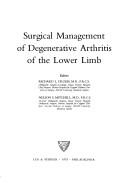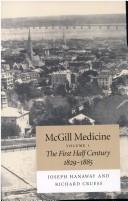| Listing 1 - 10 of 11 | << page >> |
Sort by
|

ISBN: 0812104978 Year: 1975 Publisher: Philadelphia, Pa
Abstract | Keywords | Export | Availability | Bookmark
 Loading...
Loading...Choose an application
- Reference Manager
- EndNote
- RefWorks (Direct export to RefWorks)

ISBN: 0773513248 Year: 1996 Publisher: Montreal McGill-Queen's university press
Abstract | Keywords | Export | Availability | Bookmark
 Loading...
Loading...Choose an application
- Reference Manager
- EndNote
- RefWorks (Direct export to RefWorks)

ISBN: 1282853503 9786612853500 0773565523 9780773565524 0773513248 9780773513242 Year: 1996 Publisher: Montreal London McGill-Queen's University Press
Abstract | Keywords | Export | Availability | Bookmark
 Loading...
Loading...Choose an application
- Reference Manager
- EndNote
- RefWorks (Direct export to RefWorks)
Founded by four Scottish physicians, the McGill School of Medicine opened in 1829. Teaching style in the school followed the so-called Edinburgh tradition, which for decades emphasized anatomy and clinical observation and ignored progressive educational theory and scientific advances. Out of this conservative environment, however, emerged four remarkable young professors who would lead the reform that marked a new era in medicine at McGill. William Osler, Francis Shephard, Thomas Roddick, and George Ross introduced laboratory training to teach students the scientific method in a hands-on environment and to encourage them to develop a more sophisticated approach to clinical medicine and surgery. McGill Medicine: Volume 1 records not only the history of Canada's premier medical school but also the evolution of scientific medical education in Lower Canada.
McGill University. --- History. --- Universities and colleges
Book
Year: 1971 Publisher: Philadelphia (Pa.) : Lippincott,
Abstract | Keywords | Export | Availability | Bookmark
 Loading...
Loading...Choose an application
- Reference Manager
- EndNote
- RefWorks (Direct export to RefWorks)
Book
Year: 1971 Publisher: Philadelphia (Pa.): Lippincott
Abstract | Keywords | Export | Availability | Bookmark
 Loading...
Loading...Choose an application
- Reference Manager
- EndNote
- RefWorks (Direct export to RefWorks)
Book
ISBN: 1282863770 9786612863776 077357316X Year: 2006 Publisher: Montreal ; Buffalo : McGill-Queen's University Press,
Abstract | Keywords | Export | Availability | Bookmark
 Loading...
Loading...Choose an application
- Reference Manager
- EndNote
- RefWorks (Direct export to RefWorks)
McGill Medicine is also the story of the doctors and administrators who made all this happen: visionaries such as Principal Sir Arthur Currie and Dr C.F. Martin, who shepherded the concept of full-time faculty through the various approval processes of the school; Dr J.C. Meakins, who became, in 1924, the first full-time professor of medicine; and Dr Wilder Penfield, the founder and first director of the Montreal Neurological Institute, among many others.
Medical education --- McGill University. --- McGill University --- History.
Book
ISBN: 0521881048 9780521707428 0521707420 9780521881043 9780511547348 Year: 2009 Publisher: Cambridge Cambridge University Press
Abstract | Keywords | Export | Availability | Bookmark
 Loading...
Loading...Choose an application
- Reference Manager
- EndNote
- RefWorks (Direct export to RefWorks)
Medical education --- Physicians --- Professional Competence --- Education, Medical --- Physician's Role
Book
ISBN: 1107199565 1316172252 1281903787 9786611903787 0511436416 0511438532 0511437862 0511435614 051154734X 0511437196 Year: 2009 Publisher: Cambridge ; New York : Cambridge University Press,
Abstract | Keywords | Export | Availability | Bookmark
 Loading...
Loading...Choose an application
- Reference Manager
- EndNote
- RefWorks (Direct export to RefWorks)
Until recently professionalism was transmitted by respected role models, a method that depended heavily on the presence of a homogeneous society sharing values. This is no longer true, and medical schools and postgraduate training programs in the developed world are now actively teaching professionalism to students and trainees. In addition, licensing and certifying bodies are attempting to assess the professionalism of practising physicians on an ongoing basis. This is the only book available to provide guidance to those designing and implementing programs on teaching professionalism. It outlines the cognitive base of professionalism, provides a theoretical basis for teaching the subject, gives general principles for establishing programs at various levels (undergraduate, postgraduate, and continuing professional development), and documents the experience of institutions who are leaders in the field. Teaching aids that have been used successfully by contributors are included as an appendix.
Medical education. --- Physicians --- Professional ethics --- Study and teaching.
Book
ISBN: 1316552136 1316554090 131617848X Year: 2016 Publisher: Cambridge, England : Cambridge University Press,
Abstract | Keywords | Export | Availability | Bookmark
 Loading...
Loading...Choose an application
- Reference Manager
- EndNote
- RefWorks (Direct export to RefWorks)
This book presents ideas, evidence and guidance for those interested in using the most recent advances in knowledge about learning and human development to enhance medical education's ability to form competent, caring and publicly responsible physicians. It does this by establishing the development of a professional identity in medical students and residents as a primary goal of medical education. This new approach is emerging from experience and experiment by medical educators articulating a new way of understanding their mission. It is an optimistic book - the voices are those of the leaders, theorists and experienced practitioners who have found in this new approach a promising way to confront the challenges of a new era in medicine. It summarizes the theoretical basis of identity formation, outlines our current knowledge of how best to assist learners as they acquire a professional identity, and addresses the issue of assessment of progress towards this goal.
Medical education. --- Physicians --- Professional ethics --- Study and teaching.
Book
ISBN: 9781316178485 9781107495241 Year: 2016 Publisher: Cambridge Cambridge University Press
Abstract | Keywords | Export | Availability | Bookmark
 Loading...
Loading...Choose an application
- Reference Manager
- EndNote
- RefWorks (Direct export to RefWorks)
This book presents ideas, evidence and guidance for those interested in using the most recent advances in knowledge about learning and human development to enhance medical education's ability to form competent, caring and publicly responsible physicians. It does this by establishing the development of a professional identity in medical students and residents as a primary goal of medical education. This new approach is emerging from experience and experiment by medical educators articulating a new way of understanding their mission. It is an optimistic book - the voices are those of the leaders, theorists and experienced practitioners who have found in this new approach a promising way to confront the challenges of a new era in medicine. It summarizes the theoretical basis of identity formation, outlines our current knowledge of how best to assist learners as they acquire a professional identity, and addresses the issue of assessment of progress towards this goal.
Lesgeven --- Doceren --- Gezondheidszorg
| Listing 1 - 10 of 11 | << page >> |
Sort by
|

 Search
Search Feedback
Feedback About UniCat
About UniCat  Help
Help News
News